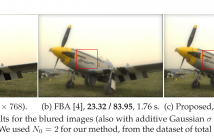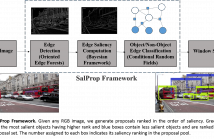
The International Conference on Image Processing (ICIP), sponsored by the IEEE Signal Processing Society, is the premier forum for the presentation of technological advances and research results in the fields of theoretical, experimental, and applied image and video processing. ICIP has been held annually since 1994, brings together leading engineers and scientists in image and video processing from around the world. Visit website.

- Read more about LUCKY DCT AGGREGATION FOR CAMERA SHAKE REMOVAL
- Log in to post comments
We consider the task of removing the effect of camera shake during a long exposure. Technically, this is a blind deconvolution problem in which both the image and the motion blur have to be jointly inferred. Several algorithms have been proposed till date for removing camera shake that work with one or more images. However, most of these algorithms are computationally expensive and hence cannot be used in real-time.
- Categories:
 5 Views
5 Views
In this paper, we propose a novel object proposal generation scheme by formulating a graph-based salient edge classification framework that utilizes the edge context. In the proposed method, we construct a Bayesian probabilistic edge map to assign a saliency value to the edgelets by exploiting low level edge features. A Conditional Random Field is then learned to effectively combine these features for edge classification with object/non-object label. We propose an objectness score for the generated windows by analyzing the salient edge density inside the bounding box.
- Categories:
 164 Views
164 Views- Read more about MULTISPECTRAL FOCAL STACK ACQUISITION USING A CHROMATIC ABERRATION ENLARGED CAMERA
- Log in to post comments
Capturing more information, e.g. geometry and material, using optical cameras can greatly help the perception and understanding of complex scenes. This paper proposes a novel method to capture the spectral and light field information simultaneously. By using a delicately designed chromatic aberration enlarged camera, the spectral-varying slices at different depths of the scene can be easily captured.
icip oral.pdf
- Categories:
 15 Views
15 Views- Read more about V. Bruns, M.A. Martinez-del-Amor, H. Sparenberg - GPU-friendly EBCOT variant with single-pass scan order and raw bit plane coding (POSTER)
- Log in to post comments
A major drawback of JPEG 2000 is the computational complexity of its entropy coder named Embedded Block Coder with Optimized Truncation (EBCOT). This paper proposes two alterations to the original algorithm that seek to improve the trade-off between compression efficiency and throughput. Firstly, magnitude bits within a bit plane are not prioritized by their significance anymore, but instead coded in a single pass instead of three, reducing the amount of expensive memory accesses at the cost of fewer truncation points.
- Categories:
 96 Views
96 Views- Read more about DIRECT MULTI-SCALE DUAL-STREAM NETWORK FOR PEDESTRIAN DETECTION
- Log in to post comments
- Categories:
 3 Views
3 Views- Read more about DIRECT MULTI-SCALE DUAL-STREAM NETWORK FOR PEDESTRIAN DETECTION
- Log in to post comments
- Categories:
 3 Views
3 Views- Read more about Principal Noiseless Color Component Extraction by Linear Color Composition with Optimal Coefficients
- Log in to post comments
In this paper, we propose a principal color component extraction
method that is simply performed by linear color composition (transformation)
of R, G, B colors, but its composite coefficients are calculated
so as to obtain a noisy-texture-less principal component of
RGB color images. Our method is related to principal component
analysis (PCA) and edge preserving smoothing by total variation
(TV) minimization. The resultant image becomes a principal color
component image with the minimum total variation. We show this
- Categories:
 Views
Views
- Read more about LOW COMPLEXITY IMAGE FUSION IN BAYER DOMAIN USING A MONOCHROME SENSOR AND BAYER SENSOR
- Log in to post comments
Mobile cameras have come a long way since their evolution and have replaced digital still cameras. However, their lowlight photography performance needs significant improvement. Dual camera systems consisting of a monochrome sensor and a Bayer sensor offer us a way to improve the low-light photography. The existing dual camera systems use post-processing methods after Image Signal Processor (ISP) for image fusion which are computationally intensive and use two ISPs. We propose a novel architecture in which the image fusion can be done in Bayer domain prior to the ISP.
- Categories:
 50 Views
50 Views
- Read more about Convolutional Gated Recurrent Networks for Video Segmentation
- Log in to post comments
Semantic segmentation has recently witnessed major progress, but most of the previous work focused on improving single image segmentation. In this paper, we introduce a novel approach to implicitly utilize temporal data in videos for online segmentation. This design receives a sequence of consecutive video frames and outputs the segmentation of the last frame. Convolutional gated recurrent networks are used for the recurrent part to preserve spatial connectivities in the image. This architecture is tested for both binary and semantic video segmentation tasks.
ICIP17.pdf
- Categories:
 30 Views
30 Views- Read more about CSMSDL: A Common Sequential Dictionary Learning Algorithm for Multi-Subject fMRI Data Sets Analysis
- Log in to post comments
Sequential dictionary learning algorithms has gained widespread acceptance in functional magnetic resonance imaging (fMRI) data analysis. However, many problems in fMRI data analysis involve the analysis of multiple-subject fMRI data sets and the existing algorithms do not extend naturally to this case. In this paper we propose an algorithm dedicated to multiple-subject fMRI data analysis. The algorithm is named SMSDL for sequential multi-subject dictionary learning and differs from existing dictionary learning algorithms in its dictionary update stage.
- Categories:
 64 Views
64 Views